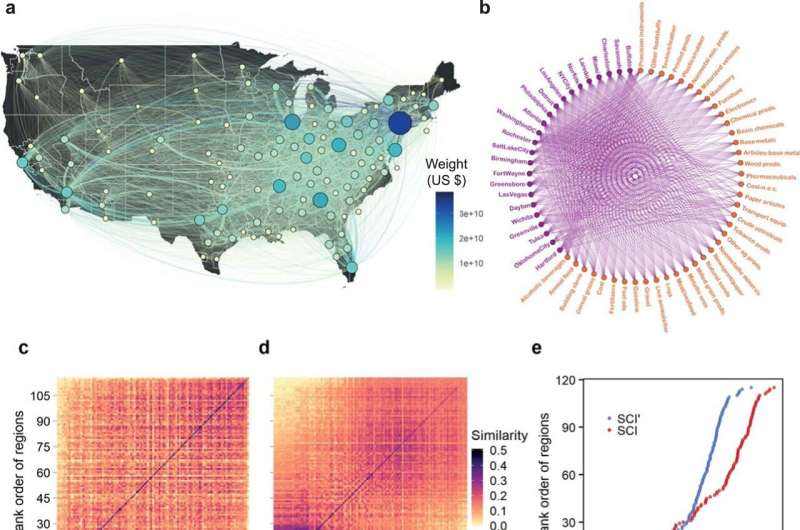This article has been reviewed according to Science X's editorial process and policies. Editors have highlighted the following attributes while ensuring the content's credibility:
fact-checked
trusted source
proofread
Cities can benefit from complex supply chains, researchers find

During the early days of the pandemic, consumers faced shortages and abrupt price increases on common goods ranging from toilet paper and coffee to bicycles and lumber. While the complexity of supply chains may contribute to the problem in some cases, Penn State researchers found that complex and diverse supply chains may actually protect cities from shortages under stress. They published their work in npj Urban Sustainability.
"Longstanding research has found that if supply chains get too complex, they can become problematic," said corresponding author Alfonso Mejia, associate professor of civil and environmental engineering. "But the opposite tends to be true in nature: In ecological systems, there is a well-known connection between complexity and resiliency."
Diversity increases complexity, which is a good thing in nature, Mejia said. The diversity of an ecosystem—having many species that can do various tasks—makes that system less vulnerable in the face of wildfires, floods and other natural disasters.
"The redundancy of multiple species doing the same things in different ways enables an ecosystem to better respond to shocks," Mejia said. "If one goes away, the other can continue. We believed that what we learn from nature could be applied to human systems."
The researchers began looking at supply chains from that perspective, examining whether the complexity of a diverse supply chain—one that sources products from many different suppliers—makes a city more resilient.
With nature as inspiration, Mejia and his team examined 2012–15 data from the U.S. Departments of Transportation and Energy that showed the movement of goods from 39 product categories across 69 major U.S. cities.
The researchers developed an algorithm to analyze the impact of two measures of complexity in this movement of supplies: the diversity of sources needed for a product and the volume of that product coming into the city. Using a machine learning algorithm and regression models, they compressed the large datasets and identified key patterns to predict the risk of supply shortages in cities experiencing shock.
"We found that complexity can be a good thing," Mejia said. "Cities with diverse supply chains—sources from a broad range of domestic and global suppliers—appear to be better protected against shocks and experience less-intense shortages."
The researchers found that the potential for benefits from complexity is most evident in medium-size cities with populations of 100,000–500,000 people.
"Large cities like New York and Chicago, just by being large and having less dependency on specific supply partners, are less affected by supply chain interruptions," Mejia said. "But medium cities are hurt by a lack of diversity when sourcing the supplies they need."
Mejia said he plans to test the model with data from more cities over a longer timeframe of pre- and post-pandemic years.
More information: Nazlı B. Doğan et al, Cities can benefit from complex supply chains, npj Urban Sustainability (2023). DOI: 10.1038/s42949-023-00100-5
Provided by Pennsylvania State University





















